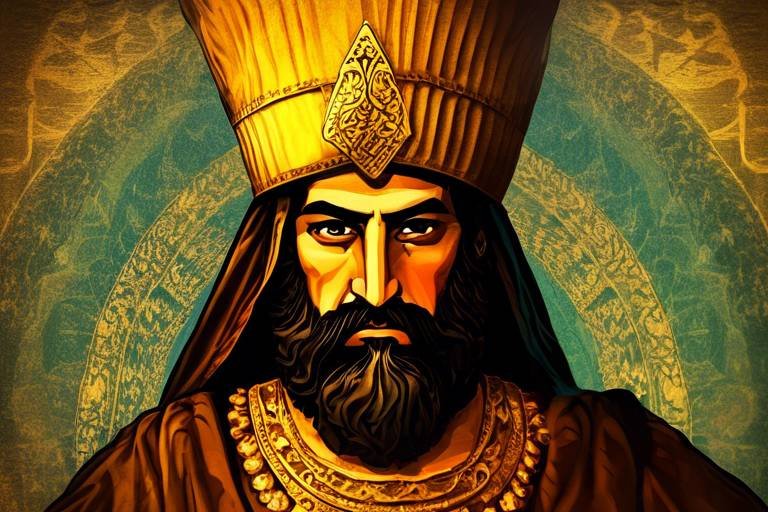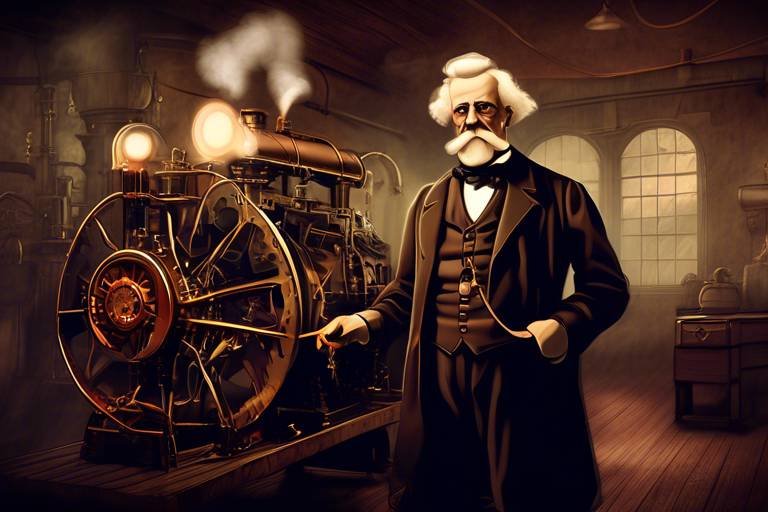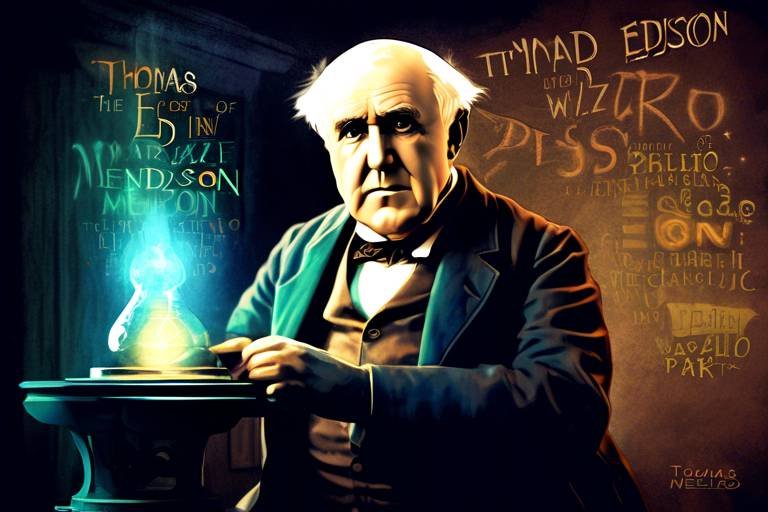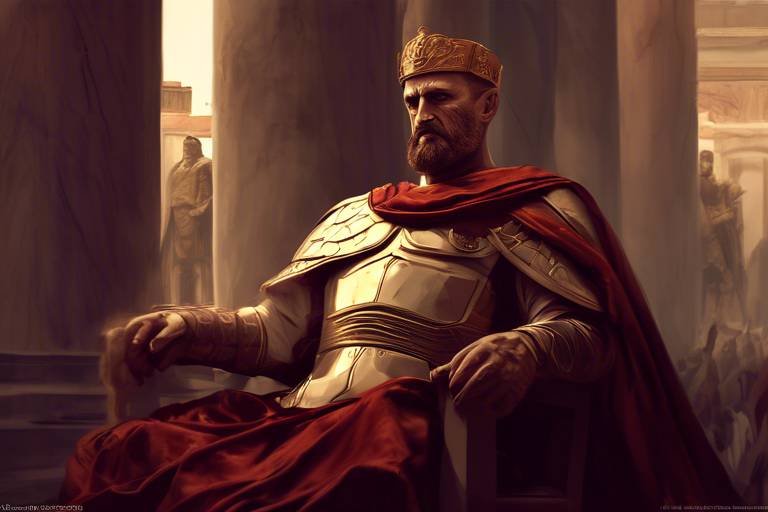Cyrus the Great: The Persian Pioneer
Cyrus the Great, known as the Persian Pioneer, stands as a monumental figure in ancient history, revered for his remarkable leadership and visionary conquests. Born into the royal family of Persia, Cyrus rose to power through a series of strategic maneuvers and bold decisions that reshaped the course of the Achaemenid Empire.
His early life was marked by a thirst for knowledge and a keen sense of justice, traits that would define his reign as a ruler. As he ascended to the throne, Cyrus displayed a rare blend of military prowess and diplomatic finesse, earning him the title of the Great among his subjects and adversaries alike.
One of Cyrus' most notable achievements was his military campaigns, where he displayed unmatched strategic acumen in expanding the borders of the Persian Empire. His conquests of Lydia and Babylon solidified his reputation as a conqueror without equal, setting the stage for the empire's dominance in the ancient world.
However, Cyrus' legacy extends far beyond his military triumphs. His approach to governance, marked by tolerance and respect for diverse cultures and religions, set a standard that would endure for centuries to come. The Cyrus Cylinder, a testament to his commitment to human rights, remains a symbol of enlightened rule in the annals of history.
Moreover, Cyrus' patronage of architectural marvels, such as the grand city of Pasargadae, showcased his appreciation for art and culture. Under his rule, the Persian Empire flourished as a melting pot of artistic expression and intellectual exchange, leaving a lasting impact on the region's cultural landscape.
Tragically, Cyrus met his end on the battlefield, leaving behind a legacy that would shape the course of Persian history. The challenges of succession that followed his death tested the empire's stability but ultimately paved the way for a new era of rule and expansion.
The enduring influence of Cyrus the Great is evident in the pages of history, where his name is synonymous with greatness and virtue. From the accounts of ancient historians to modern interpretations, Cyrus remains a figure of reverence and admiration, his legacy transcending time and borders.
Today, Cyrus the Great continues to be commemorated in various forms, his legacy celebrated in Iran and beyond. As a symbol of Persian pride and resilience, he serves as a reminder of the power of vision and leadership in shaping the course of nations and empires.

Early Life and Rise to Power
Exploring the life and accomplishments of Cyrus the Great, the founder of the Achaemenid Empire. Discover his leadership, conquests, and enduring legacy in shaping the Persian Empire and influencing future rulers.
Before Cyrus the Great became a legendary ruler, his early life laid the foundation for his future greatness. Born into the royal family of Persia, Cyrus had a childhood filled with tales of valor and leadership. His upbringing instilled in him a sense of duty and ambition, preparing him for the challenges that lay ahead.
As he ascended to the throne of Persia, Cyrus faced numerous obstacles and rivals vying for power. However, his strategic acumen and charismatic leadership quickly set him apart. With a keen eye for opportunity and a daring spirit, Cyrus swiftly consolidated his rule and established himself as a visionary leader with a grand vision for the Persian Empire.
One pivotal moment that defined Cyrus' early reign was his conquest of Media, a bold move that showcased his military prowess and strategic brilliance. This victory solidified his position as a formidable ruler and set the stage for his future conquests.
Detailing Cyrus' strategic military campaigns, including the conquest of Lydia, Babylon, and other territories that expanded the reach of the Persian Empire.
Examining Cyrus' approach to governance, religious tolerance, and his famed Cylinder emphasizing human rights, influencing governance practices for centuries.
Exploring the architectural marvels commissioned by Cyrus, such as Pasargadae, and his promotion of diverse cultural influences within the empire.
Unraveling the circumstances surrounding Cyrus' death in battle and the succession challenges that followed, shaping the future of the Persian Empire.
Analyzing the long-lasting impact of Cyrus the Great on Persian history, his portrayal in various sources, and his influence on subsequent rulers and empires.
Reflecting on the contemporary recognition and commemoration of Cyrus the Great, including his symbolic significance in modern Iran and global perceptions of his legacy.

Military Campaigns and Conquests
Exploring the military campaigns and conquests of Cyrus the Great provides a glimpse into his strategic brilliance and expansion of the Persian Empire. Known for his tactical acumen and military prowess, Cyrus embarked on a series of conquests that reshaped the geopolitical landscape of the ancient world.
One of Cyrus' most notable military campaigns was the conquest of Lydia, a wealthy kingdom in Asia Minor. By defeating King Croesus, Cyrus not only secured valuable resources but also demonstrated his ability to overcome formidable opponents through a combination of military strategy and diplomacy.
Another significant conquest was the capture of Babylon, a major city in Mesopotamia. Cyrus' victory over the Babylonian forces led to the fall of the Neo-Babylonian Empire and marked the beginning of Persian rule in the region. This conquest solidified Cyrus' reputation as a conqueror capable of toppling established powers.
Furthermore, Cyrus extended his conquests to other territories, including the regions of Central Asia and the Levant. Through a combination of military might and diplomatic alliances, Cyrus expanded the borders of the Persian Empire, creating a vast and diverse realm under his rule.
His military campaigns were not only focused on territorial expansion but also aimed at establishing stability and order in the conquered lands. Cyrus implemented administrative reforms, appointed local governors, and respected the customs and beliefs of the diverse populations within his empire, fostering a sense of unity among the conquered peoples.
Moreover, Cyrus' military successes were not solely based on brute force but also on his ability to inspire loyalty and allegiance among his soldiers and subjects. His leadership style emphasized fairness, respect for different cultures, and the promotion of a unified empire built on mutual cooperation and tolerance.
In conclusion, Cyrus the Great's military campaigns and conquests were instrumental in shaping the Persian Empire and laying the foundation for its future prosperity. His strategic vision, military achievements, and commitment to governance continue to inspire admiration and study to this day.

Legacy of Tolerance and Governance
One of the most remarkable aspects of Cyrus the Great's legacy is his commitment to tolerance and effective governance, setting a precedent that would resonate throughout history. Cyrus' approach to ruling his vast empire was characterized by a remarkable level of religious tolerance, a concept that was revolutionary for its time. Rather than imposing his own beliefs on his subjects, Cyrus allowed diverse religious practices to flourish within the Persian Empire, fostering a sense of inclusivity and respect for different faiths.
Furthermore, Cyrus' famous Cylinder, a clay artifact containing his declaration of human rights, stands as a testament to his progressive governance principles. This ancient document, often hailed as one of the first human rights charters in history, emphasized the importance of freedom, justice, and compassion for all individuals under his rule. The Cylinder's principles of equality and protection of basic human rights laid the foundation for modern governance practices and continue to inspire leaders around the world.
In addition to his groundbreaking policies on tolerance and governance, Cyrus the Great also implemented innovative administrative structures that promoted efficiency and fairness within the empire. By decentralizing power and appointing local governors to oversee regions, Cyrus ensured that the diverse populations under his rule were able to govern themselves to a certain extent, fostering a sense of autonomy and stability.
Moreover, Cyrus' emphasis on infrastructure development and urban planning led to the construction of impressive architectural marvels, such as the city of Pasargadae, which showcased his commitment to blending diverse cultural influences within the empire. Through his patronage of the arts and promotion of cultural exchange, Cyrus fostered a rich and vibrant society that celebrated the contributions of various ethnic groups and traditions.
In conclusion, Cyrus the Great's legacy of tolerance and governance continues to resonate in the modern world, serving as a timeless example of enlightened leadership and inclusive governance. His enduring influence on the principles of human rights, religious freedom, and administrative efficiency underscores his status as a pioneer in shaping the course of history and inspiring generations to come.

Architectural Achievements and Cultural Contributions
When delving into the realm of Cyrus the Great's legacy, one cannot overlook his remarkable architectural achievements and profound cultural contributions that left an indelible mark on the Persian Empire. Cyrus, known for his grand vision and appreciation for diverse cultural influences, embarked on ambitious projects that showcased his architectural prowess and promoted cultural harmony within his vast empire.
One of the most iconic architectural marvels attributed to Cyrus is the city of Pasargadae, which served as the capital of the Achaemenid Empire. This ancient city, characterized by its innovative urban planning and majestic structures, stands as a testament to Cyrus' architectural ingenuity and his commitment to creating enduring monuments that would stand the test of time.
Furthermore, Cyrus' architectural endeavors extended beyond Pasargadae, encompassing a wide array of construction projects that reflected his eclectic taste and appreciation for artistry. From intricate palaces adorned with exquisite artwork to monumental gateways that symbolized power and grandeur, Cyrus' architectural legacy continues to awe and inspire historians and art enthusiasts alike.
In addition to his architectural achievements, Cyrus the Great was also a patron of diverse cultural influences within the Persian Empire. By fostering an environment of cultural exchange and tolerance, Cyrus encouraged the flourishing of artistic expression, intellectual pursuits, and religious diversity among his subjects.
Moreover, Cyrus' promotion of cultural inclusivity not only enriched the fabric of the Persian Empire but also paved the way for future rulers to embrace multiculturalism as a source of strength and unity. His legacy as a visionary leader who valued the richness of different cultural traditions endures as a guiding principle for fostering harmony and understanding in a diverse world.
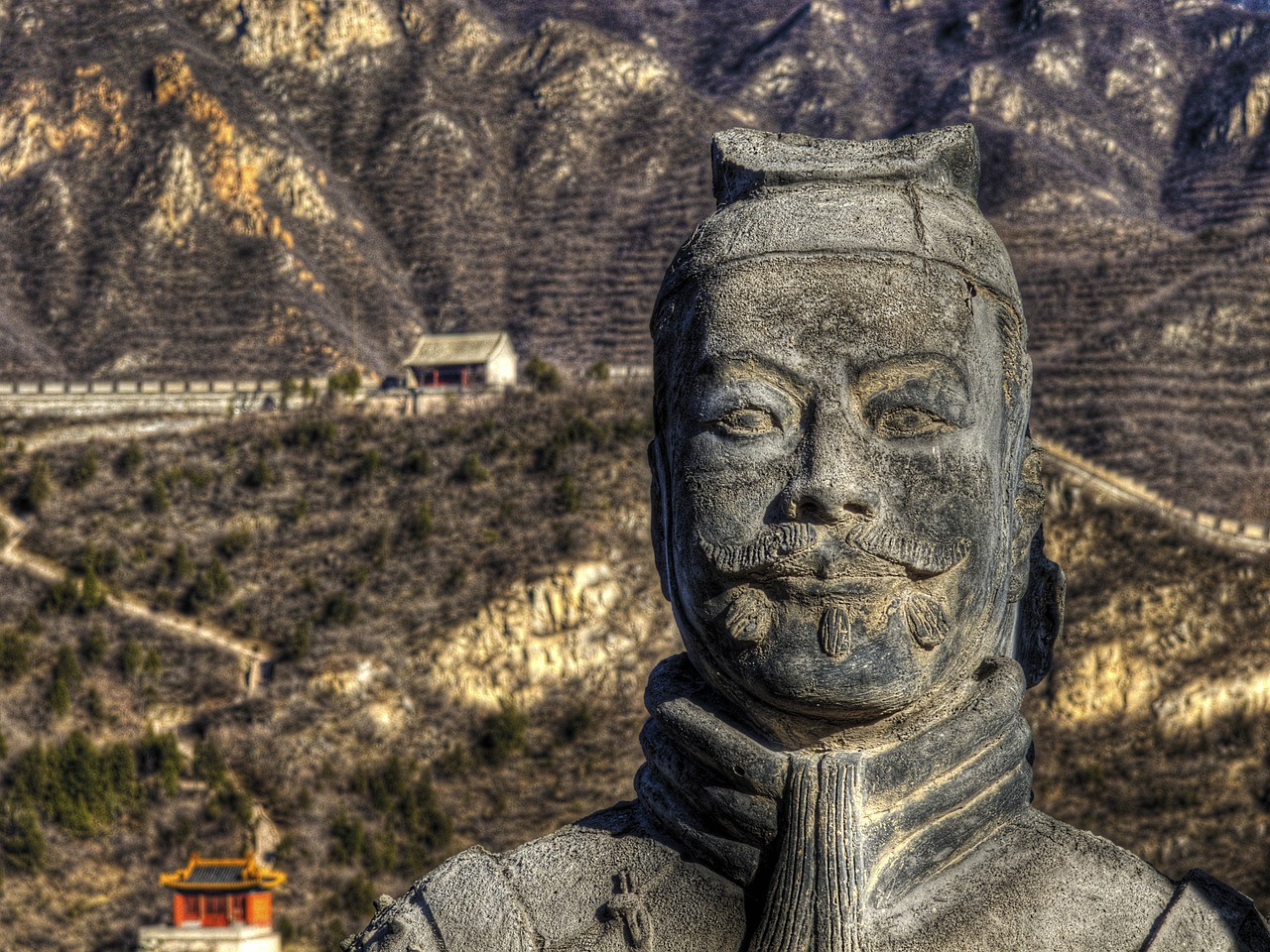
Death and Succession
Exploring the life and accomplishments of Cyrus the Great, the founder of the Achaemenid Empire. Discover his leadership, conquests, and enduring legacy in shaping the Persian Empire and influencing future rulers.
Insight into Cyrus' upbringing, his ascension to the throne of Persia, and the pivotal moments that defined his early reign as a visionary leader.
Detailing Cyrus' strategic military campaigns, including the conquest of Lydia, Babylon, and other territories that expanded the reach of the Persian Empire.
Examining Cyrus' approach to governance, religious tolerance, and his famed Cylinder emphasizing human rights, influencing governance practices for centuries.
Exploring the architectural marvels commissioned by Cyrus, such as Pasargadae, and his promotion of diverse cultural influences within the empire.
Unraveling the circumstances surrounding Cyrus' death in battle and the succession challenges that followed, shaping the future of the Persian Empire.
Analyzing the long-lasting impact of Cyrus the Great on Persian history, his portrayal in various sources, and his influence on subsequent rulers and empires.
Reflecting on the contemporary recognition and commemoration of Cyrus the Great, including his symbolic significance in modern Iran and global perceptions of his legacy.

Historical Impact and Enduring Influence
Exploring the life and accomplishments of Cyrus the Great, the founder of the Achaemenid Empire. Discover his leadership, conquests, and enduring legacy in shaping the Persian Empire and influencing future rulers.
Insight into Cyrus' upbringing, his ascension to the throne of Persia, and the pivotal moments that defined his early reign as a visionary leader.
Detailing Cyrus' strategic military campaigns, including the conquest of Lydia, Babylon, and other territories that expanded the reach of the Persian Empire.
Examining Cyrus' approach to governance, religious tolerance, and his famed Cylinder emphasizing human rights, influencing governance practices for centuries.
Exploring the architectural marvels commissioned by Cyrus, such as Pasargadae, and his promotion of diverse cultural influences within the empire.
Unraveling the circumstances surrounding Cyrus' death in battle and the succession challenges that followed, shaping the future of the Persian Empire.
Analyzing the long-lasting impact of Cyrus the Great on Persian history, his portrayal in various sources, and his influence on subsequent rulers and empires.
Reflecting on the contemporary recognition and commemoration of Cyrus the Great, including his symbolic significance in modern Iran and global perceptions of his legacy.

Modern Reverence and Commemoration
Modern Reverence and Commemoration of Cyrus the Great encompasses a deep-rooted respect and admiration for his contributions to Persian history and culture. In contemporary Iran, Cyrus holds a revered status as a symbol of national pride and unity, with his legacy celebrated through various means. From grand monuments to annual festivals, the memory of Cyrus continues to be honored and commemorated.
One of the most notable tributes to Cyrus is the Cyrus Cylinder, a cylindrical clay tablet inscribed with declarations attributed to Cyrus the Great. This ancient artifact is considered a symbol of human rights and tolerance, reflecting Cyrus' progressive governance principles. The Cyrus Cylinder has become a powerful emblem of justice and freedom, resonating with modern audiences worldwide.
Furthermore, Cyrus' legacy is perpetuated through educational initiatives and cultural events that highlight his achievements and influence. Museums dedicated to Persian history often feature exhibitions on Cyrus the Great, showcasing his leadership and the enduring impact of the Achaemenid Empire. Through these platforms, contemporary audiences can gain a deeper appreciation for Cyrus' historical significance.
In addition to formal commemorations, Cyrus the Great is also celebrated in popular culture, literature, and art. His persona has inspired numerous works of fiction, poetry, and music, capturing the imagination of artists and creatives across the globe. Through these creative expressions, Cyrus' legacy transcends time and geographical boundaries, leaving a lasting imprint on the collective consciousness.
Frequently Asked Questions
- Who was Cyrus the Great?
Cyrus the Great was a renowned Persian ruler who founded the Achaemenid Empire and is known for his strategic military conquests and visionary leadership.
- What were some of Cyrus' major accomplishments?
Cyrus the Great's major accomplishments include the expansion of the Persian Empire through conquests of territories like Lydia and Babylon, as well as his promotion of religious tolerance and governance principles.
- What is the significance of Cyrus' Cylinder?
Cyrus' Cylinder is a famous artifact that emphasizes human rights and religious tolerance, showcasing his progressive approach to governance that influenced future practices.
- How did Cyrus' death impact the Persian Empire?
Cyrus' death in battle led to succession challenges that shaped the future of the Persian Empire, impacting its governance and territorial stability.
- Why is Cyrus the Great still revered today?
Cyrus the Great is revered for his enduring legacy of tolerance, governance, and cultural contributions, which continue to influence modern perceptions and commemorations.

